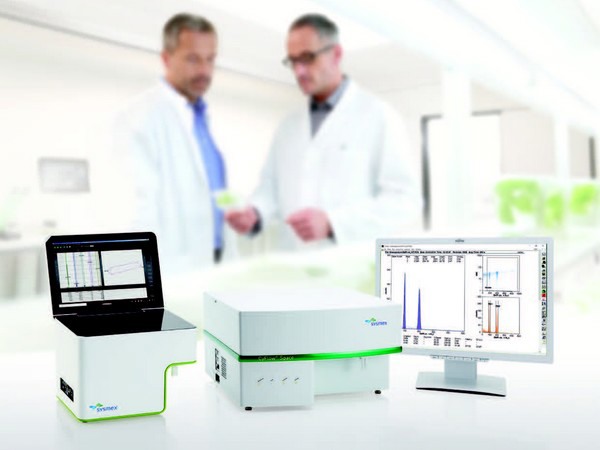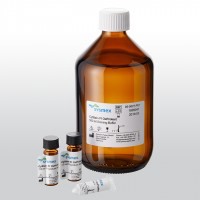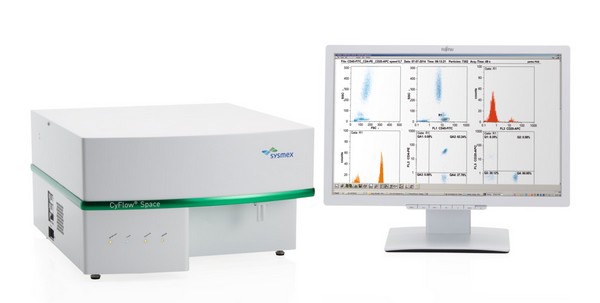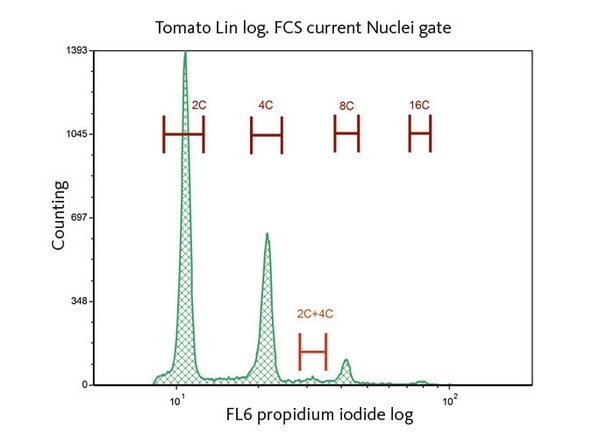A breeder (or a grower) who, by doing crossing, is looking for new varieties, really only wants one thing: quick and easy insight into the amount of DNA and chromosomes that a piece of plant material contains.
After the takeover of Partec by Sysmex in 2013, Partec's flow cytometer, with customer convenience in mind, has been further developed so that now a total package with hardware, specific software and reagents can be offered.

Cyflow ploidy analyzer and Space
It also includes the latest set of reagents for ploidy and chromosome size determination: CyStain UV OxProtect and CyStain PI OxProtect. "With the new reagents that are brought directly to the plant material to be able to measure, air can no longer reach a piece of leaf and therefore no oxidation can occur," says Kars de Wildt of Sysmex-Partec, responsible for sales of the technology in the Benelux. “Every breeder has a number of varieties where oxidation is a problem. No oxidation means less oxidation noise and a clearer readable result for the breeder and/or grower, making a ploidy determination or chromosome measurement more interpretable.”

Photo right: CyStain PI OxProtect
With UV
But first back to "earlier times", because flow cytometers have been around for decades (Partec launched the first flow cytometer on the market in 1969), just like Partec and Sysmex themselves. Where Partec, which originated in 1960, is well known thanks to the fact that almost all major breeders do have "a Partec" in-house, Sysmex is somewhat less so as supplier of in-vitro diagnostic products. But many specialists in the market will know that Sysmex works with ****UV lamps in their systems where many other parties in the market work with (much more expensive) lasers.
“Our reagents are UV-adjusted and that is where we distinguish ourselves,” says Kars before explaining something about the history of Sysmex. “Sysmex was founded in 1968 and its core business is hematology, a medical specialty that deals with abnormalities of the blood, using fluorescence flow-based cell technology. Sysmex Benelux also has a large branch with an Industry department, which includes Sysmex Partec, which now also offers total solutions in horticulture."

Sysmex Partec Space
Do it yourself
Where flow cytometry has long been regarded as complicated and complex, and that still may be the case when you go into detail, over the years the technology has been simplified by Sysmex Partec.
“Breeders and growers who now outsource ploidy and/or genome size determination should take a look at the number of tests they have had carried out and whether it is worthwhile to purchase a system themselves,” says Kars. “Nowadays you see that it is certainly of interest for medium-sized companies, now that it is also easier to do it yourself. Regardless of the knowledge level of the customer and the country where the breeder/grower is located, the technology, the total solution is easy to use.”
According to Kars, a company does not need to have a complicated laboratory. “I know customers, also here in the Netherlands, who pre-treat, filter and measure samples at the kitchen table all day long.”

Ploidy determination with a tomato sample
Ensure quality
Kars sees many developments in the field of breeding at customers, for example in the breeding of melons. “When you consider that this was once a star fruit, you know that a lot has happened in the field of DNA. But you can also see the same in cucumber, bell pepper, gerbera and in fact any crop, because a different colour or a new resistance makes everything slightly different in terms of DNA.”
Moreover, the technology is not only important for research purposes and the development of new varieties, but equally good for issuing quality labels, Kars says. "With a variety from which the grower receives seed, the grower, like the breeder, naturally wants to be sure whether the seed meets all requirements and whether it is a diploid (double chromosome pair) or a tetraploid (four chromosome pairs)."
Finally, with the latest developments as described above, Kars would like to say that companies that still have a Partec flow cytometer from before 2013 can have their system checked by a trained engineer from the manufacturer Sysmex Partec. “Companies can contact us for that. Also for the direct supply of reagents, we are also extra committed to the total solution with service and advice from A to Z."
For more information:
Sysmex Partec
www.sysmex.nl
Kars de Wildt
wildt.kars@sysmex.nl
+31 (0) 623781465
